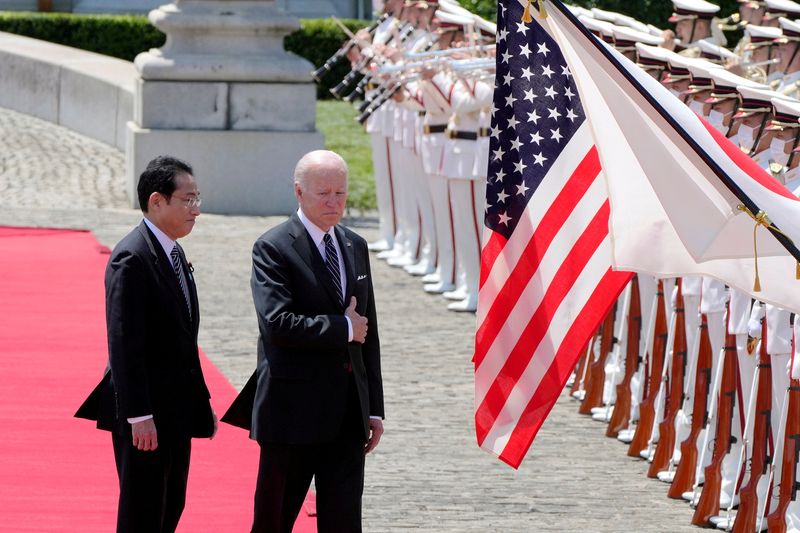By Tim Kelly and Trevor Hunnicutt
TOKYO/WASHINGTON (Reuters) – President Joe Biden is trying to revive interest in a plan to build the first high-speed rail line in the United States using Japanese high-speed trains, and sources say he will likely discuss the project with the Japanese prime minister in Washington. this week.
The leaders may publicly express support for the multibillion-dollar Texas project after Wednesday’s talks, which were partly overshadowed by U.S. opposition to another Japanese investment, Nippon Steel’s planned purchase of U.S. Steel.
Prime Minister Fumio Kishida’s state visit to Washington, the first by a Japanese leader in nine years, aims to demonstrate that the allies are closer to economic and security ties.
The project connecting Dallas and Houston will be on the agenda of the talks, said three sources close to the summit preparations, who sought anonymity because they could not speak to the media.
It will likely be mentioned in joint statements following the talks, two of the sources said.
However, a senior Biden administration official said the project did not appear to have matured to the point where leaders would publicly announce progress.
All sources warned that details of the final agreements could change before the visit.
Japan’s Foreign Ministry declined to comment, saying the governments were still coordinating joint statements from the talks. The White House declined to comment.
Leaders’ support could unlock new liquidity from the Federal Railroad Administration and other Department of Transportation funds.
But the project, estimated to cost between $25 billion and $30 billion, still faces potential hurdles in Texas and the U.S. Congress.
Biden’s transportation secretary, Pete Buttigieg, has expressed support for the plan.
“We believe in this,” he said Sunday in an interview with NBC 5. “Obviously it has to evolve into a more specific design and vision, but everything I’ve seen makes me very excited.”
With large distances between major cities, huge commuter populations, and lack of public transportation, the United States has attracted multiple high-speed rail proposals.
But none were ever built, held up by political wrangling, land ownership conundrums and skyrocketing costs.
A train connecting Houston and Dallas, the fourth and fifth largest metropolitan areas in the United States by population, has been discussed since the 1980s. Previous efforts had been hampered by objections from private landowners along its route.
Support from Biden and Kishida, project supporters say, will help attract money from private investors for a “shovel-ready” plan.
The 240-mile (380 km) long rail link, to be built and operated by Texas Central Partners and Amtrak, is expected to reduce travel times between cities to about 90 minutes, from 3 1/2 hours by car.
Japanese state lenders, including the Japan Bank for International Corporation, have made loans to help develop the project, which is buying shinkansen bullet train technology from the Central Japan Railways Company.
Advancing the project would be a victory for the Biden administration, which has promoted climate-friendly policies and rail investments.
But it is likely to draw criticism, particularly from hardline Republican lawmakers in the U.S. House of Representatives who have in the past opposed the use of public funds for rail projects, and now oppose their use to rebuild the Francis Scott Baltimore’s Key Bridge, which was destroyed by a cargo ship last month.
Plans for a possible nod of support from leaders follow Biden’s opposition to Nippon Steel’s plan to buy US Steel Corp, saying it must remain in US hands.

Biden, who signed a $1 trillion infrastructure bill into law in 2021 that includes $66 billion for rail projects, will face Donald Trump in a rematch of November’s presidential election.
With voters placing the economy at the top of their concerns, Democratic President Biden has pushed government-backed construction projects that his aides say could create jobs and ease inflationary pressures.